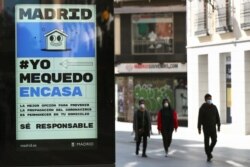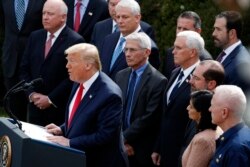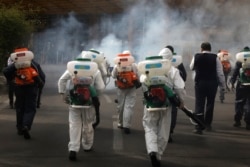The World Health Organization says Europe has replaced China as the epicenter of the coronavirus pandemic.
WHO chief Tedros Adhanom Ghebreyesus told reporters Friday in Geneva that in Europe “more cases are now being reported every day than were reported in China at the height of its epidemic.''
Officials in Italy said Friday the number of coronavirus infections soared by more than 2,500 in the previous 24 hours, bringing the total number infected in the country to 17,660. The number of coronavirus deaths in Italy, the hardest-hit country outside of China, is 1,266.
Spain was reportedly close to declaring a two-week state of emergency to contain the spread of infections that the country’s health officials said Saturday topped 5,700, an increase of more than 1,500 in 24 hours.
Spanish officials are also expected to announce additional strict control measures, including a limit on free movement outside residents’ homes, except for emergencies.
Denmark and Poland joined other countries Saturday in closing their borders to most travelers, while Russia said it will shut its borders Sunday with Norway and Poland.
New cases and deaths also accelerated Friday in Germany, while in the United States President Donald Trump declared a national emergency.
Trump said at a news conference outside the White House the move would “unleash the full power of the federal government” and will allow states and cities to receive $50 billion in federal dollars to combat the pandemic.
Trump also said the U.S. government is partnering with the private sector to accelerate the capacity to test for the virus, including setting up drive-through testing sites. The United States has been criticized for its slow roll out of coronavirus test kits.
The president also announced his administration was waiving interest rates on student loans, increasing the U.S. emergency stockpile of oil, and working with Google to develop a website that could help people figure out when and where to get tested for coronavirus.
The coronavirus national emergency has prompted the U.S. Defense Department to stop all domestic travel for military service members and their families, effective Monday and lasting to May 11.
The United States has 1,920 cases and 41 deaths from the virus.
More than 145,000 people have been infected by COVID-19 worldwide, with the most in China, where over 3,000 patients have died, and upwards of 62,000 people already have recovered. While China still accounts for more than 60% of global infections, it reported just eight new COVID-19 infections Friday.
It is an astonishing turnaround for China where thousands of new infections have been recorded in one day.
The virus first emerged in China's Wuhan province late last year.
The single-digit increase of new cases does not mean, however, the virus is on its way out of the Asian nation. There are still thousands of Chinese who remain infected with the virus that has spread across the world.
France's president announced Friday that leaders of the world's largest democracies, the Group of Seven, would hold a video-conference summit Monday to discuss coordinating a response to battling the pandemic.
Iran said Saturday 1,365 new cases were confirmed over a 24-hour period, raising the total to 12,729. Ninety-seven people died over that period, boosting the death toll in Iran, the world’s third-hardest hit by COVID-19, to 12,729.
The Iranian government announced Friday it will employ near-martial law to combat the virus. State television said security forces would fan out across the country, clearing shops, streets and roads of people.
Iranian global health scholar Kamair Alaei told VOA Persian that he believes the actual number of cases in Iran is 40,000.
Rwanda reported its first case of the coronavirus on Saturday. The ministry of health said the infected person is an Indian citizen who arrived in Rwanda from Mumbai on March 8. There were more than 60 confirmed cases in Africa as of Friday, according to the WHO.
In Washington, the U.S. House of Representatives approved a coronavirus relief package negotiated by House Democrats and the White House. The legislation includes free coronavirus testing, paid sick and family leave, and food assistance for poor families. The Senate will consider the bill Monday.
Around the world, the pandemic is turning life upside down and inside out for nearly every man, woman and child. New travel restrictions, closures and cancellations are taking place in countries across the globe virtually every hour.
Schools in many countries around the world have been closed for tens of millions of students, forcing parents to scramble to find day care or a way to work from home.
Few in the United States have avoided being affected by the coronavirus outbreak in some way, including the president.
Brazilian communication secretary Fabio Wajngarten tested positive for the virus, days after he met with President Trump at his Mar-a-Lago resort in Florida. Trump said Friday he will “most likely” get tested for coronavirus, but not because of the people he came into contact with. At least three people at the meetings have tested positive for COVID-19
Brazilian officials said Friday that President Jair Bolsonaro has tested negative for the virus, while Miami, Florida, Mayor Francis Suarez, who attended an event with Wajngarten, said he has tested positive.
The wife of Canadian Prime Minister Justin Trudeau has tested positive for the virus, Canada announced late Thursday. The couple went into isolation Wednesday after she showed mild symptoms after returning from a speaking engagement in London.
The Masters became the latest sports event to be canceled, with officials saying that golf’s first major of the year would not be held as planned in April. It follows cancellations in the United States by major league baseball, soccer, hockey and college basketball. Around the world, sports leagues have also been canceling events.
The United Nations Friday said that all staff at its New York headquarters would telework for the next four weeks unless they were required to be in the building, following a growing trend for government and private sector workers around the world to work from home to try to stop the spread of the pandemic.
Lisa Schlein in Geneva, Margaret Besheer in New York and VOA Persian’s Farhad Pouladi and Arian Risbaf contributed to this report.











